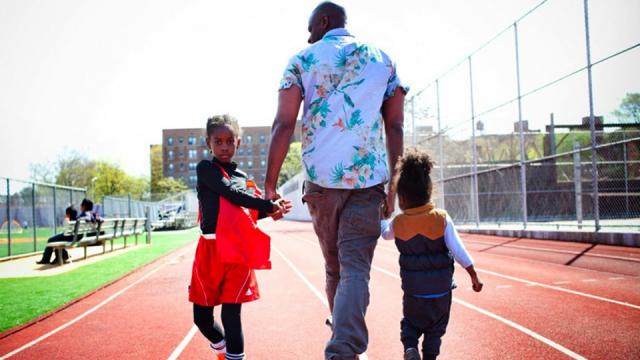
In New York, almost 120,000 black men between the ages of 25 and 54 are missing from everyday life. In Chicago, 45,000 are, and more than 30,000 are missing in Philadelphia. Across the South — from North Charleston, S.C., through Georgia, Alabama and Mississippi and up into Ferguson, Mo. — hundreds of thousands more are missing.
They are missing, largely because of early deaths or because they are behind bars. Remarkably, black women who are 25 to 54 and not in jail outnumber black men in that category by 1.5 million, according to an Upshot analysis. For every 100 black women in this age group living outside of jail, there are only 83 black men. Among whites, the equivalent number is 99, nearly parity.
African-American men have long been more likely to be locked up and more likely to die young, but the scale of the combined toll is nonetheless jarring. It is a measure of the deep disparities that continue to afflict black men — disparities being debated after a recent spate of killings by the police — and the gender gap is itself a further cause of social ills, leaving many communities without enough men to be fathers and husbands.
Perhaps the starkest description of the situation is this: More than one out of every six black men who today should be between 25 and 54 years old have disappeared from daily life.
“The numbers are staggering,” said Becky Pettit, a professor of sociology at the University of Texas.
And what is the city with at least 10,000 black residents that has the single largest proportion of missing black men? Ferguson, Mo., where a fatal police shooting last year led to nationwide protests and a Justice Department investigation that found widespread discrimination against black residents. Ferguson has 60 men for every 100 black women in the age group, Stephen Bronars, an economist, has noted.
The gap in North Charleston, site of a police shooting this month, is also considerably more severe than the nationwide average, as is the gap in neighboring Charleston. Nationwide, the largest proportions of missing men generally can be found in the South, although there are also many similar areas across the Midwest and in many big Northeastern cities. The gaps tend to be smallest in the West.
Incarceration and early deaths are the overwhelming drivers of the gap. Of the 1.5 million missing black men from 25 to 54 — which demographers call the prime-age years — higher imprisonment rates account for almost 600,000. Almost 1 in 12 black men in this age group are behind bars, compared with 1 in 60 nonblack men in the age group, 1 in 200 black women and 1 in 500 nonblack women.
Higher mortality is the other main cause. About 900,000 fewer prime-age black men than women live in the United States, according to the census. It’s impossible to know precisely how much of the difference is the result of mortality, but it appears to account for a big part. Homicide, the leading cause of death for young African-American men, plays a large role, and they also die from heart disease, respiratory disease and accidents more often than other demographic groups, including black women.
Several other factors — including military deployment overseas and the gender breakdown of black immigrants — each play only a minor role, census data indicates.
The gender gap does not exist in childhood: There are roughly as many African-American boys as girls. But an imbalance begins to appear among teenagers, continues to widen through the 20s and peaks in the 30s. It persists through adulthood.
The disappearance of these men has far-reaching implications. Their absence disrupts family formation, leading both to lower marriage rates and higher rates of childbirth outside marriage, as research by Kerwin Charles, an economist at the University of Chicago, with Ming-Ching Luoh, has shown.
The black women left behind find that potential partners of the same race are scarce, while men, who face an abundant supply of potential mates, don’t need to compete as hard to find one. As a result, Mr. Charles said, “men seem less likely to commit to romantic relationships, or to work hard to maintain them.”
The imbalance has also forced women to rely on themselves — often alone — to support a household. In those states hit hardest by the high incarceration rates, African-American women have become more likely to work and more likely to pursue their education further than they are elsewhere.
The missing-men phenomenon began growing in the middle decades of the 20th century, and each government census over the past 50 years has recorded at least 120 prime-age black women outside of jail for every 100 black men. But the nature of the gap has changed in recent years.
Since the 1990s, death rates for young black men have dropped more than rates for other groups, notes Robert N. Anderson, the chief of mortality statistics at the Centers for Disease Control and Prevention. Both homicides and H.I.V.-related deaths, which disproportionately afflict black men, have dropped. Yet the prison population has soared since 1980. In many communities, rising numbers of black men spared an early death have been offset by rising numbers behind bars.
It does appear as if the number of missing black men is on the cusp of declining, albeit slowly. Death rates are continuing to fall, while the number of people in prisons — although still vastly higher than in other countries — has also fallen slightly over the last five years.
But the missing-men phenomenon will not disappear anytime soon. There are more missing African-American men nationwide than there are African-American men residing in all of New York City — or more than in Los Angeles, Philadelphia, Detroit, Houston, Washington and Boston, combined.
3 WAYS TO SHOW YOUR SUPPORT
- Log in to post comments











